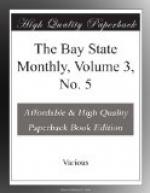But the reputation of Mr. Crapo in Massachusetts and the country at large rests preeminently upon his services in the National House of Representatives. He was elected to fill a vacancy in the Forty-fourth Congress and was returned at three successive elections, enjoying to an unusual degree the favor and approbation of his constituents. In the Forty-fifth Congress he was a member of the committee on Foreign Affairs. In the Forty-sixth he served on the committee on Banking and Currency, and was chairman of this important committee in the next Congress. He introduced the bill to extend the charters of the National Banks, and by his skillful and persistent efforts the bill became a law to the satisfaction of all sound business men. In his connection with this bill, Mr. Crapo added to his reputation as an able lawyer, that of a sound financier and a judicious statesman.
Representing a constituency whose interests are largely identified with the fishing industries, Mr. Crapo has naturally been considered a champion of the fishermen. A strong speech was made by him on the resolution recommending the abrogation of the fishing articles of the Treaty of Washington, of which the following is an example:—
“For seventy years this Government, and prior to that the Colonies, paid liberal bounties to aid the development and increase of our fishing marine. These bounties have been abandoned, and the New England fishermen, relying upon their energy and enterprise do not ask a renewal of them. But they do ask that the United States shall not offer a bounty to build up this industry in the hands of rivals. When we are confronted with a declining merchant marine, when the carrying trade is passing into the hands of foreigners, when we remember that our whaling fleet, which twenty years ago numbered 600 ships with 18,000 sailors, the best sailors on the globe, disciplined and educated in voyages of three and four year’s duration—is now reduced to 163 vessels with less than 5,000 men, we may well inquire, where are we to look for experienced seamen to man our navy in case of foreign war? We can build vessels of war in a few weeks when the emergency arises. With our resources of timber, and iron and copper, and every material entering into the construction of our vessels, we can build ships at short notice in our private shipyards, even if we cannot in our navy yards, but efficient and hardy sailors come only from the training and experience of years of toil and danger upon the sea.”
This brief extract illustrates Mr. Crapo’s logical, direct method of making an argument. When occasion presents itself, he is capable of rising to heights of eloquence equalled by few who sit in the National Capitol. The following passage is from a brief speech occasioned by the presentation to the United States, April 22, 1880, of Thomas Jefferson’s writing desk on which was written the original draft of the Declaration of Independence. Mr. Crapo offered a joint resolution of acceptance and in closing his eloquent remarks said:—




